EDUCATING YOUR HEART – 1
By Mr. B. K. Misra
“It is the heart that reaches out to the goal, not mind,” says Bhagawan Baba. According to Him Heart is not the seat of irrational emotions, as is commonly believed. It is the spiritual centre of an individual, which promotes intuition, and discrimination (vichara). The sense urges are purified here, and the ego, the feeling of separateness, is moulded to merge in the universality of God. The primary function of education, therefore, is educating this heart centre with compassion, or Daya, or empathy. Bhagawan says education is not confined to the four walls of a classroom, the whole universe is the classroom for a willing learner.
A Sight that Shocked Me
Some decades ago, once I left home at about 8 in the morning to go somewhere within the town. I hired a cycle rickshaw, a three-wheel passenger car manually driven by a single person, and also the cheapest transport system for short distances within the locality. It was a Sunday, and the town was just waking up to the business of living. I took to the road littered with the previous day’s leftovers of the clients of the many mobile chat vendorsfor which that particular street was well known. The clients stand around the four-wheel kitchen-cum-sales centres, fill their leaf plates on their out-stretched palms, and eat the dainty dish of a mixture of at least half a dozen hot-sour-sweet items that rejuvenate their afternoon taste buds. Then they drop the plates on the road wherever they stood, hoping the litter would be taken care of by the gods of democracy, the roaming cattle, or the scavenging street children!
People pass over the unfortunate heaps in their cars, scooters, cycles, and bullock carts, on covered or uncovered feet, while the droppings of bullocks and the stray cattle mix that into a nameless paste, to become one with the tarred road, which gradually loses its identity. Once in a while the khaki clad representatives of the omnipresent democracy raid the mobile restaurants, threaten them, take a few free plates of the famous chat and add their powerful leaf plates to the heap before performing the ritual of hitting a nearby tea vendor’s stall in order to attract a ‘pecial elaich tea’ to top a satisfying afternoon.
 |
That street has a number of open sky meat stalls where this non-vegetarian fare is offered fresh and bloody. My rickshaw plodded through the familiar dirt and tried to speed up. Suddenly I noticed half a dozen cars and more than two dozen scooters, bikes and bicycles of all description parked by the roadside. People in their bedroom dresses, in lungi and banyans, were relaxing, gossiping, smoking as if there wasn’t a hurry in the world. My vehicle slowed down, so as to not offend the civilized humans exercising their human rights. While the driver was maneuvering his rider through a relaxed Sunday, I peeped out trying to gather what had attracted the educated elite, juice of the emerging society of a resurgent India, to the street that morning. As soon as I peeked through the crowd, I pulled back in shudder, and asked my driver to hurry away.
By the side of the road was the bloody stump of a mighty tree, and stood there two half-clad hefty men, one with a fearsome butcher’s knife, the other holding the neck of a poor hapless lamb between his fingers on the stump. The knife was running on the goat’s neck, and blood was dripping into a bowl placed below it. A group of at least 15 people, of all whom were highly accomplished and educated elite of the town were eagerly looking at it, probably thinking of a luscious Sunday lunch with family. I recognized one of them was a doctor - some sort of a specialist, and the other a professor of Literature at the local university. Another was a deputy secretary at a Government department famous for his huge mustache. They were eager to carry home parts of the lamb’s body, its sinews, veins, pieces of bone, its heart…. I felt so sick, I returned home by another road, and tried to sleep the whole afternoon in order to nurse my frayed nerves. But the fact that the incident is still visible to me, four decades later, proves how indelible the impact of that moment was on my mind.
Why did the sight affect me so deeply? Is it because I have been a non meat-eater? Is it because an innocent lamb was killed? Not necessarily. Buying meat from the butcher to cook a lunch may look innocuous, but I am not sure standing by without reacting while a butcher’s knife runs into the neck of a helpless animal, its blood dripping into a bowl, thinking of the delicious lunch it would make, is any admirable sign of a civil society. Enlarge this canvas, and you needn’t be surprised if you see Kasab & Co mauling down people at the Taj (this refers to the terrorist attack in the Taj Hotel in Mumbai in November 2008).
Is Our Living Enriching Life?
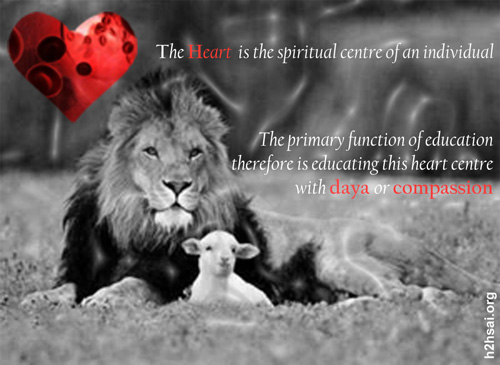 |
Newspapers, TV channels, websites spill out every minute great real life instances of men and women outsmarting animals in every field! They also tell us that new international standard schools are coming up everywhere in a great hurry; new universities, medical institutions, management establishments, art centres, are raising their proud heads all over the country to announce the incredible pace of education. The governments are in a hurry to aid them, academicians are in a hurry to catch up with the knowledge explosion, investors are in a hurry to push their dividends graph up, developers are in a hurry to capture farmlands and green areas to build skyscrapers, everybody is racing towards happiness – my happiness sans my neighbour’s!
What has happened to our sensibilities? Do they have a place in our ‘incredible’ civilization?
In a very striking judgment the apex court of India recently expressed its agony at the way even educated people refrain from reacting to public humiliation of women, allow political parties to put up people of questionable characters as our representatives without bating an eyelid, and then without any qualms anoint them with power!
Bhagawan says, the heart should be the seat of compassion, Daya, in order to justify it is educated.
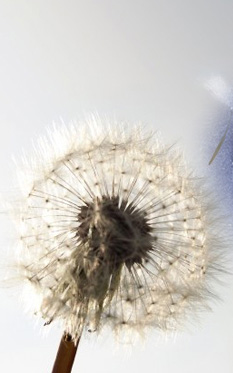 |
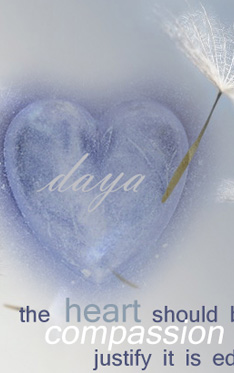 |
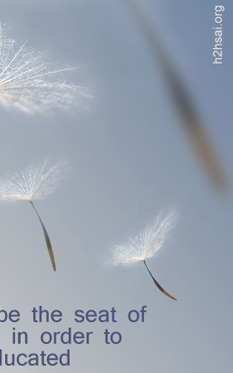 |
Therefore education isn’t primarily a provider of a living; it qualifies the kind of life we choose to live. Living may promote life, but life has to define living. But in our progressive syllabi the heart is no more than a blood-pumping device. The new priest of education is an untempered mind, and all our freedom is held hostage by it. Characteristically however the most elite of our progressive society worship this camouflaged tiger. All programmes in our schools and colleges are aimed at making the intellect keener, sharper, cleverer, but not deeper with empathy.
The Commendable Character of a Little One
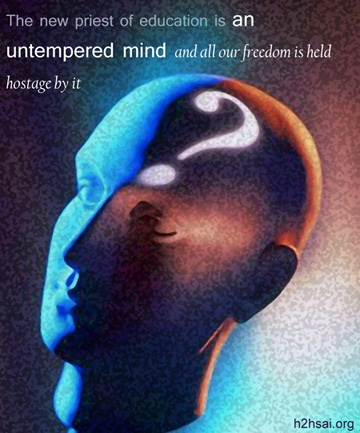 |
One teacher of the recently opened Smt. Eswaramma English Medium School at Prasanthi Nilayam was telling me about a certain student of her’s in the first standard. This girl would always watch her friends eating their lunch during the school lunch hour. If anyone does not have enough dal or vegetable to go with rice, she would save that from her own box, and offer it to her friend. The moving thing about this is that she always feels happy doing so. Does our education promote this spontaneous empathy?
There is another kid, a boy, she told me, who always comes a little early to school. He would put his bag in the classroom, and wait near the gate. When class one children arrive in autos or busses, or in their parents’ scooter or bike, and he finds that it is difficult for a certain child to carry the luggage to his or her class room, he would do it himself. One day it was raining, and when the other kids arrived at the gate without an umbrella, he was found taking them one after another into the school building under his own umbrella. Another day it was drizzling when the school closed for the day, and he was found taking out his own towel from his bag and drying up a teacher’s wet scooter parked under a tree. When asked why he was doing that, he replied, “How can ma’m go home on a wet scooter? Her sari will become wet.” The remarkable thing about this seven year old is that nobody ever asked him to do such things, and he does this quite naturally, without any self-consciousness.
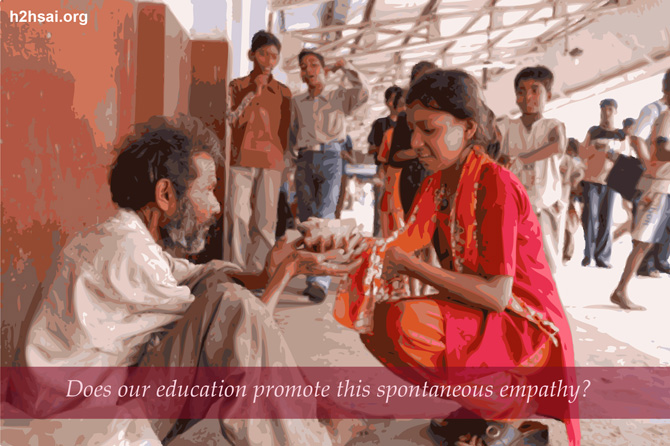 |
Do we have any programmes in our schools and colleges to build up this precious aspect of true education - empathy? We award medals to percentage of marks, to a keen intellect; what about a heart filled with compassion? I personally would feel privileged to honour such a child. Bhagawan has been defining the end of education as character, and end of knowledge as love, for decades now. Character can blossom only on the ground of compassion and love, but they are misnomers now in our education set up. I remember here a stunning experience about poverty of our intellectuals.
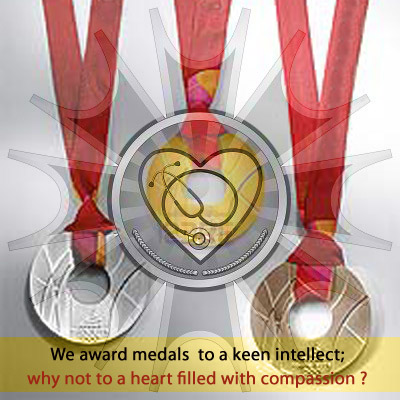 |
A friend of mine was a programme executive in a certain branch of All India Radio. He was a Sai devotee, and wanted to record a symposium on Bhagawan’s famous saying ‘End of education is character’ to be broadcast on some occasion. He invited a well-known professor of English, a journalist and an administrator, to the studio, briefed them about the project, and asked the professor to initiate discussion. The professor interpreted the statement with quite an intellectual tinge saying, ‘Every object in the world has a certain character, so education too has a character…’ etc. Consequently, the symposium was never aired.
Mind is endowed with such power that if it chooses to lead the instruments of pleasure it may take the host down the dusk, but if it is led by instruments of perception, it may power the steepest climb to the hill top dawn to achieve freedom from all darkness below. That, Bhagawan says, is real education, to be free from darkness, untruth, and violence (mortality). The higher we climb, the greater is the sweep of our vision, the deeper our sensibilities to the breathtaking view of all created things, linked up by an incredible thread of enlightened existence. That is compassion, Daya.
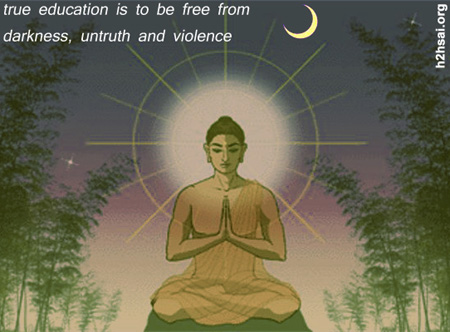 |
The author is a post graduate in Arts from Ravenshaw College, Odisha, India, and taught English literature for 13 years in various universities including 7 years in his alma mater. In 1966, he came into Bhagavan’s fold under amazing circumstances, and since then longed to serve at His Lotus Feet in Prasanthi Nilayam. His dream was fulfilled in 1980 when he joined the Sri Sathya Sai Higher Secondary School, where he serves till date even after retirement.
Dear Reader, did this article inspire you in any way? Do you have a similar story to share? Please tell us your reflections about this article by writing to h2h@radiosai.org mentioning your name and country. Thank you for your time.
- Heart2Heart Team





